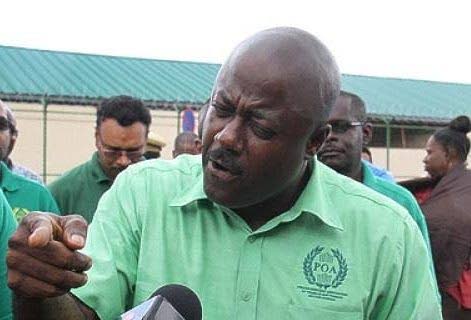Waiting for justice

SEVERAL people expressed shock after it was revealed in Parliament last month that 758 people accused of murder continue to await trial for their individual matters.
That revelation, however, was no surprise to several officials connected to the prison system who, in conversations with Newsday, said the situation was one that had been going on since the 80’s and was not limited to the murder accused.
Officials told Newsday that the stagnant justice system had left prisoners on remand frustrated to the point where the prison system could be described as a ticking time bomb.
But the prisoners who languish on remand awaiting trial are not the only people that are affected by the slow pace with which cases are heard. Families, loved ones and even victims of the people who have been locked in jail for years awaiting trial also sit day by day waiting for their time in court.
One such person is Erica Harry Belfon, who says her daughter and granddaughter were murdered by one of the 758 people waiting on remand for their day in court.
“The feelings I have, I cannot even express them,” said Belfon in a recent interview with Newsday. “Every day that passes all I can think about is my daughter and my two granddaughters.
“If he (the killer) ever comes out, police will have to hold me. It is only one daughter I had, and even though it was years ago, I still cannot come to terms with their deaths,” she lamented.
Belfon’s daughter, Patrice Thomas, was allegedly stabbed to death by a male relative in May 2016.
But before Belfon had to bury her only daughter, she had to bury her two-year-old granddaughter, Kimora Roopnarine, who was allegedly killed by the same man three years before.
When baby Roopnarine was killed in 2013, police were told by the man that the child suffered fits before dying, but an autopsy revealed the child suffered three broken ribs and blunt force trauma to the head.
Police held the man for questioning, but investigators could not arrest him because there wasn’t enough evidence.
Three years later, he was held by police for Thomas’ murder on Phyllis Lane, Enterprise, Chaguanas, outside the house where Thomas was stabbed to death.
While awaiting trial for Thomas’ murder, cold case investigators re-opened Roopnarine’s case, and, finding more evidence, charged the male relative for the baby’s death.
To date, both the alleged killer and Belfon are still waiting for his case to be heard.
Not only does she have to wait on the alleged killer’s trial, but she also has to take care of his second child, now four years old, whom he had with Thomas before he allegedly stabbed her to death.
Belfon admitted to Newsday she at first had a lot of trouble taking care of the child, but soon applied to become her legal guardian.
“There was a point in time just after it happened where I did not even want to meddle with the child. Every time I looked at her I could see his face. All I could think was her father killed my daughter. After a while I realised nothing could change what happened. I was all she had. She had no mother and no father,” Belfon said.
Belfon said after becoming her legal guardian she changed the child’s last name from the man’s to hers.
Belfon now lives with her granddaughter in Chaguanas, but is still struggling.
Belfon, a nurse, used to receive a public assistance cheque for $1,150, which helped a lot with the child’s living expenses, but still wasn’t enough to give her everything she needed.
After Belfon’s husband suffered a stroke and was sent on early retirement, she stopped sending the public assistance cheques.
“The child’s school fees alone are $1,500,” said Belfon. “I am not being paid much either, plus I have to take care of my husband. The entire left side of his body is incapacitated because of the stroke. We decided that what little the Government was giving us, we would try to make it do for the child, but now they take the child’s little grant.”
“How could you take bread from a child who has no mother and no father? Why is it that I have to pay taxes to mind a murderer in prison and my taxes cannot feed my own grandchild?” Belfon lamented.

Cerron Richards, head of the Prison Officers’ Association, said the frustration inside the prison comes not only from murder accused, but from people who have been awaiting trials for lesser charges.
“We have been complaining about this for years to no avail,” Richards said, “It creates a contention between prisoners and prison officers. It also leaves prison officers disenchanted. The level of resentment which prisoners have after being imprisoned and still waiting trials for long periods could be the reason why things are so volatile in the prison.”
Commissioner of Prisons Gerard Wilson told Newsday all three remand areas at the Port of Spain Jail, the Maximum Security Prison, and Golden Grove Prison are overcrowded. And it has been that way since the 80’s.
“The media is now beginning to appreciate what we have been dealing with. We have been dealing with overcrowding since 1983. One prisoner awaited a matter for as long as 14 years. Some cases stay in the magistrates’ court for six to seven years, and then four to five years for a trial. It depends on the amount of money a prisoner has to pay lawyer fees. It leads to having a lot of frustrated people in prison,” Wilson said. “If we don’t take a serious look at the prison system and justice system, we will have problems.”
Richards also added that the infrastructure in the remand yard was deplorable. Prisoners are forced into cells with little room, and no beds. Most cells do not even have toilets, but there is a hole or a bucket where prisoners would have to relieve themselves.
Chair of the Catholic Commission for Social Justice at Archdiocese of Port of Spain, Leela Ramdeen, considers the conditions in the overcrowded prisons inhumane and said the prison system, as it now stands, contributes just as much to crime in the nation as poverty and social exclusion.
“If we are going to be a country that considers human rights, then the systems must work. We have to ask ourselves what are we doing to make the wheel grind so slowly. Many cases are restarting. Some are starting after ten years,” she said, “I am not saying that people who commit crimes should have great comfort but basic amenities should be put in place. You cannot reduce crime without looking at the conditions that create it.”
Speaking to Attorney General Faris Al-Rawi recently on the matter, he said the Government was doing many things to quicken the pace in which cases were being heard. These changes include proceeding with criminal proceedings rules, introducing judge only trials, increasing the amount of judges from 36 to 64, giving the Chief Justice an allowance for specialist courts, putting tenders out for public defenders to populate a public defender system and the expansion of the DPP’s office.
But for people like Belfon, justice could not come fast enough. Belfon said she had to struggle every day to take care of the child, but she does it because she knows she is innocent. She however continues to wait for justice for her daughter, whose killer is still being cared for by taxpayers’ money.
“I want them to find him guilty and for him to serve time in prison until he dies. I want justice to be served.” Belfon said.


Comments
"Waiting for justice"